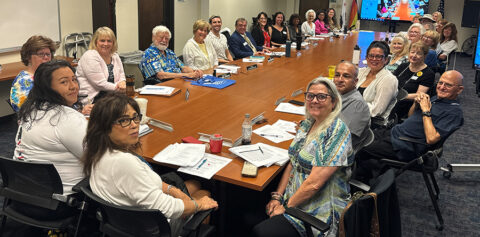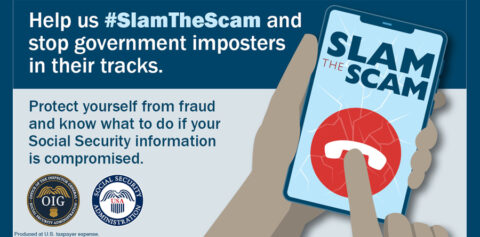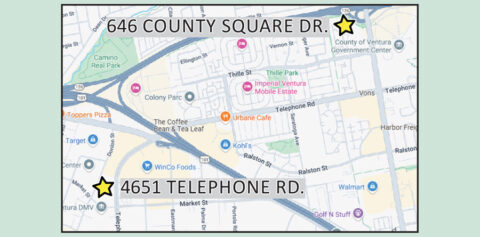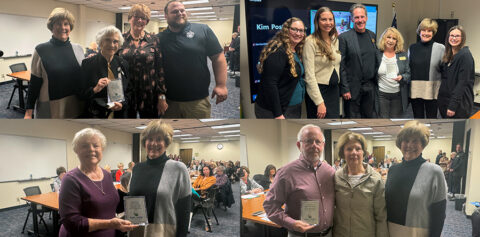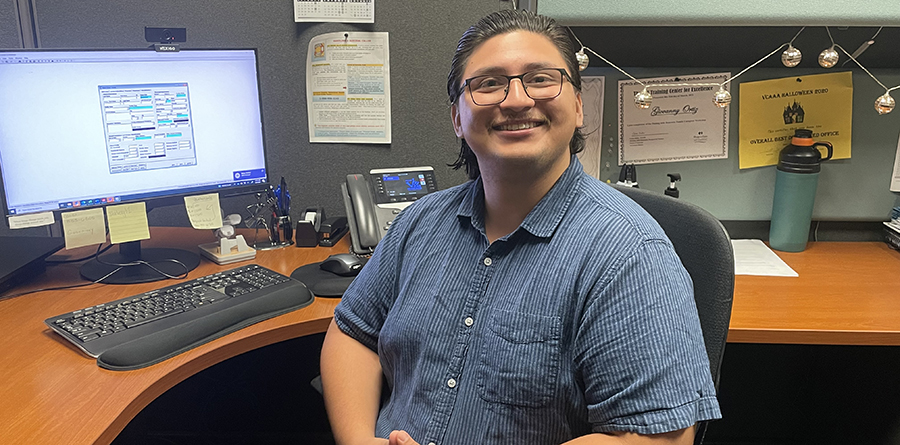A primary VCAAA goal is to help people live at home for as long as they are able. It becomes much more difficult when a person is afflicted with Alzheimer’s disease, or any related dementia, and if they are living alone. But, the VCAAA has a program to aid these individuals. Since its inception four years ago, Giovanny Ortiz has been the social worker assisting them in maintaining their independence for as long as possible. Here is his story:
Q: Where did you grow up and go to school?
A: I was born and raised here in Ventura. I went to UC Santa Cruz and got my bachelor’s degree in sociology. While I was in college I worked at Aegis Assisted Living and was working with seniors then, but the VCAAA was my first real job.
Q: How did you end up working here?
A: I knew since college that I wanted to be a social worker. This program was brand new and they needed someone to pilot it. I think I interviewed pretty well. I might not have had all the experience, but they must’ve liked my can-do attitude because I was brought onboard and began my career here in July 2019.
Q: What was it like coming in and being not just new to this agency, but starting a new program?
A: I had a lot of co-workers and fellow social workers to lean on, so that made it easier. It was exciting. It felt like my baby. It was kind of like running my own small business. You’ve got to market the program and get clients, and then actually provide the tangible services that will benefit seniors in the community.
Q: Describe what the Alzheimer’s Disease and Related Dementia (ADRD) program does.
A: The ADRD program was created to help people with Alzheimer’s disease and related dementias, or anyone at risk of developing one of them, who are living at home alone to continue living in the community for as long as safely possible. We provide different resources to help support the client’s care needs and activities of daily living. I like to tell clients and their families that I’m part of the team and am here to help them navigate this journey.
Q: Go a little deeper into that. What are the kinds of things that have to happen to allow someone to safely live at home with these conditions?
A: Of course, everyone’s case is different. But the main goal is to make sure that their basic needs are met. For instance, we might try to get their bills on auto-pay or enroll them into a home-delivered meal program. Other things we might do can include helping them to enroll in IHSS, In-Home Supportive Services, so that they can have a regular caregiver who will help them to meet their care needs in areas such as grocery shopping, laundry, chores, etc. Essentially, we want to simplify things for our clients and make their lives easier, so that they can enjoy a higher quality of life.
Due to the nature of the population that I work with, clients don’t always have all the information that would make it easier for someone in my position to connect them to services. If I wanted to connect someone with IHSS, for instance, I might ask them what kind of insurance they have. But because of the dementia, they might not know that information or know where they might have that information available. So there’s some investigative work in trying to figure out what resources and services clients have and are connected to, and how we might be able to supplement those resources. I work pretty closely with Adult Protective Services because the population that I serve is vulnerable. I get a lot of referrals from them, and I appreciate being able to work alongside them, because they’re great at going in-depth with their investigations into what resources clients have, and I am able to get a lot of useful information from them.
Ultimately, we are trying to prevent or delay long-term institutionalization. Often times a lot of the things we do kind of act like band-aids because they are temporary remedies for a progressive condition. Although the remedies are sometimes only temporary, they translate well for the person living with dementia because for that specific period of time their care needs are met, and they are able to enjoy a higher quality of life. Almost every client I’ve worked with has wanted to age at home. Their routines are often what keep them going. If their lives are uprooted and they find that their routines have been disrupted because of placement in a long-term care facility, there is a chance that their conditions will progress faster.
Q: How many clients are you working with?
A: I would say around 45ish.
Q: So what’s a day at work like for you?
A: A regular day is calling clients, and reviewing the case notes to see what we were working on and checking in on those matters. I might send referrals to different organizations, and sometimes do in-house referrals. I’ll go out in the field if we’re going to do an initial assessment, or if it’s been a while, to check in with the client and make sure that everything’s okay. Home visits and field work are so important because if you’re just talking to someone on the phone, especially with dementia, and you’re asking them how they’re managing, they might just say it’s all good, but we don’t know if that’s actually the case. So we do home visits to see the condition that they’re in, and assess for self-neglect or other abuses.
Q: Are there any good stories that come to mind about clients who have been helped with this program?
A: Sometimes it’s just the small victories. It’s kind of difficult in my case because we know that the dementia that the client is living with will progress. Things are going to get more difficult. A success story might be a client finally getting placed if they have reached the point where they can’t take care of themselves anymore. One good project I was a part of was when I got to distribute robotic pets to clients during the pandemic. All the clients that ended up receiving one loved their new companions. Another time, I had worked with Housing to port a client’s Housing voucher to Florida where, after also utilizing the ElderHelp program for assistance with moving services, we were able to get her moved closer to family who would help support her. It was a tricky process coordinating the move with the client, family, and the Housing Authorities in Ventura and Florida, but in the end we were able to make it happen.
Q: As you said, you’re working with people that aren’t going to get better because of this disease. Is that difficult?
A: Ultimately, the client is what’s important. I try to stay in a mindset of making it personal. I ask myself, “What if this was my grandma or my mom?” It pushes me to advocate with my heart and do my best to get my clients the services that they need.
Q: How do you know when it’s time that they can’t live at home by themselves anymore?
A: It depends. If they’re already not taking care of themselves, chances are that they are already involved with APS. Usually, an indicator of needing to be placed is when someone is no longer able to meet their basic needs even with the support of family, friends, or other formal supports. Some of the basic needs to consider might be related to personal care, maintaining a safe home environment, or even the ability to remember how to make and eat meals. If someone is unable to manage those care needs, it may be time to consider placement.
Q: What do you like most about the job?
A: I like being able to help people in the community. It’s fulfilling to know that I help people access tangible supports that reinforce their ability to age at home. Plus, it’s nice to hear from clients and families thanking you for helping them during a time when they may have been unsure about what to do or who to turn to. It’s a sentiment that I think rings true for everybody at this agency.
Q: Who is someone that inspired you?
A: My mom. She raised me and my three brothers pretty much by herself. She’s got a bleeding heart and that’s definitely where I get it from. Seeing her work two jobs and do everything she could to make sure me and my brothers were taken care of, that really inspired me. I think the best trait that I inherited from her is being able to live life from a place of love and compassion. It’s gotten me this far!
Q: What do you like to do away from work?
A: I play music with my brother. We’ve been playing music together for a really long time and I have a very musically inclined family. I like to go to the gym and am also currently taking some courses to get a certification in Amazon Web Service architecture. Other than work, my life basically revolves around music, working out and learning. And, I also like to hang out with people that are important to me. Being able to share experiences with them is huge for me!
To learn more about the ADRD program, please visit the case management page on the VCAAA website or call the VCAAA at (805) 477-7300.

